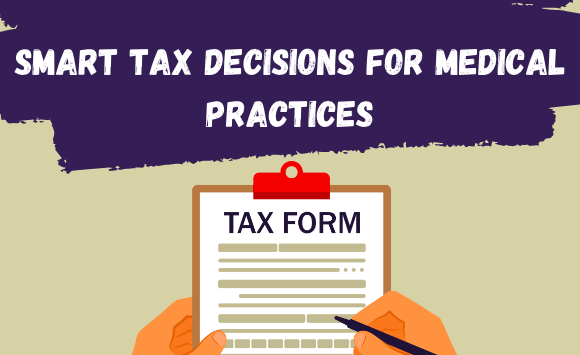As a medical practice, you are no doubt aware of the importance of tax planning and preparation. Making the right decisions when it comes to taxes can save you money and give you more flexibility in your day-to-day operations. Here are some smart tax decisions that medical practices should consider for the upcoming year.
Take Advantage of Business Expense Deductions and Tax Credits
One way to save money on your taxes is to take advantage of business expense deductions. In particular, you should look into deductions related to employee expenses, travel costs, equipment purchases, and professional services. By taking full advantage of these deductions, you can reduce your taxable income and keep more money in your pocket.
Tax credits are incentives offered by the government to encourage businesses to invest in certain initiatives or products that support their industry or community. For example, medical practices may be eligible for research & development credits or investment tax credits if they purchase certain types of equipment or technology. These credits can help lower the amount of money owed in taxes each year, so it’s important to take advantage of them when possible.
Keep Organized Financial Records
Staying organized with your financial records is an essential part of running a successful medical practice. Not only does it make things easier to access year-round, but staying on top of your financial records can help save you time and money during tax season. Your accounts payable and general ledger should be up-to-date, ensure that all invoices match the bills sent, and document any refunds you get from vendors. Furthermore, any type of purchase made for the business should also be tracked using a receipt or some other form of verification. Designate one place where all these receipts are kept for quick reference. Finally, if applicable, keep clear notes about loans or credit lines taken out by the business separately from other expenses in accordance with IRS rules. Spending even a few hours each month organizing your financial records will benefit you come tax time and beyond–it’s a smart decision for any medical practice.
Consider Investing in Retirement Accounts
Investing in retirement accounts is one of the smartest decisions for medical practices to make in terms of tax optimization. Allocating pre-tax income into 401(k) or 403(b) plans as well as other retirement organizations can minimize current-year taxes and build long-term financial security. For example, contributions to a plan like a Simplified Employee Pension (SEP) IRA are considered pretax business expenses and are therefore exempt from federal income tax until they are withdrawn. Additionally, earning potential over time through compounding interest on investments can create a notable financial cushion when it comes time for retirement. For medical practices looking to make tax-savvy decisions today for future financial stability, retirement account investing is the way to go.
Maximize Your Home Office Deduction
One last tax decision that medical practices should consider is maximizing their home office deduction. If you have an office at home that is used exclusively for business purposes, then you may be able to deduct a portion of your rent or mortgage payments as well as other associated costs such as utilities and repairs. This can add up quickly so make sure to take full advantage of this deduction if it applies to your situation.
Tax planning and preparation are essential components of running any successful business—especially a medical practice! By taking advantage of business expense deductions, investing in retirement accounts, and maximizing your home office deduction, you can ensure that your practice stays on the right side of the law while saving money along the way. With proper tax planning and preparation, there’s no reason why your medical practice shouldn’t be able to succeed financially this year.

Krishna Murthy is the senior publisher at Trickyfinance. Krishna Murthy was one of the brilliant students during his college days. He completed his education in MBA (Master of Business Administration), and he is currently managing the all workload for sharing the best banking information over the internet. The main purpose of starting Tricky Finance is to provide all the precious information related to businesses and the banks to his readers.




